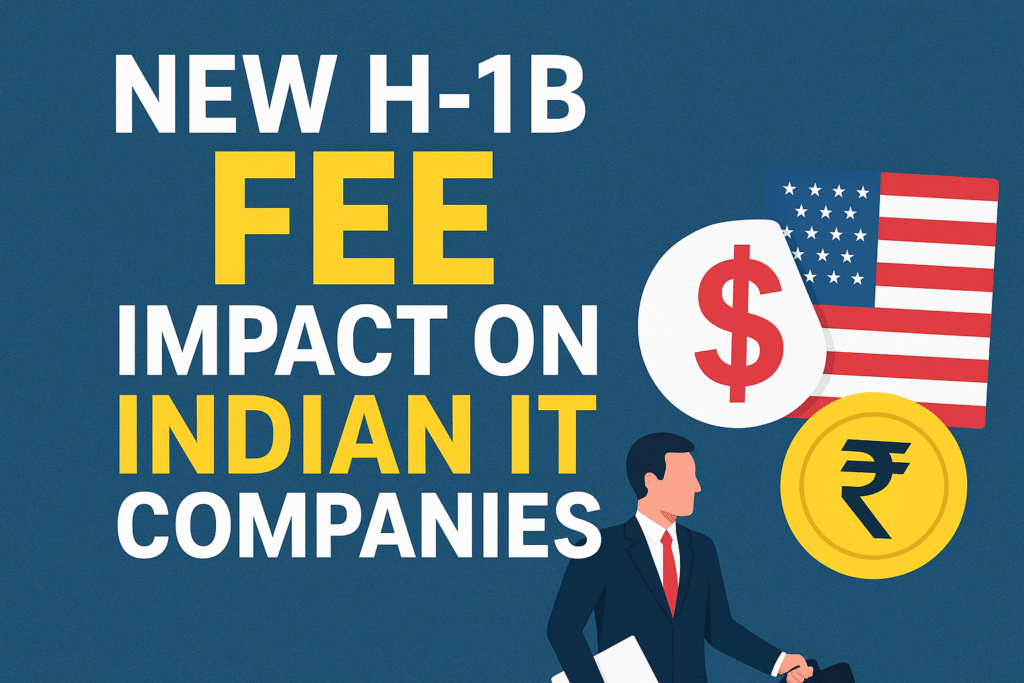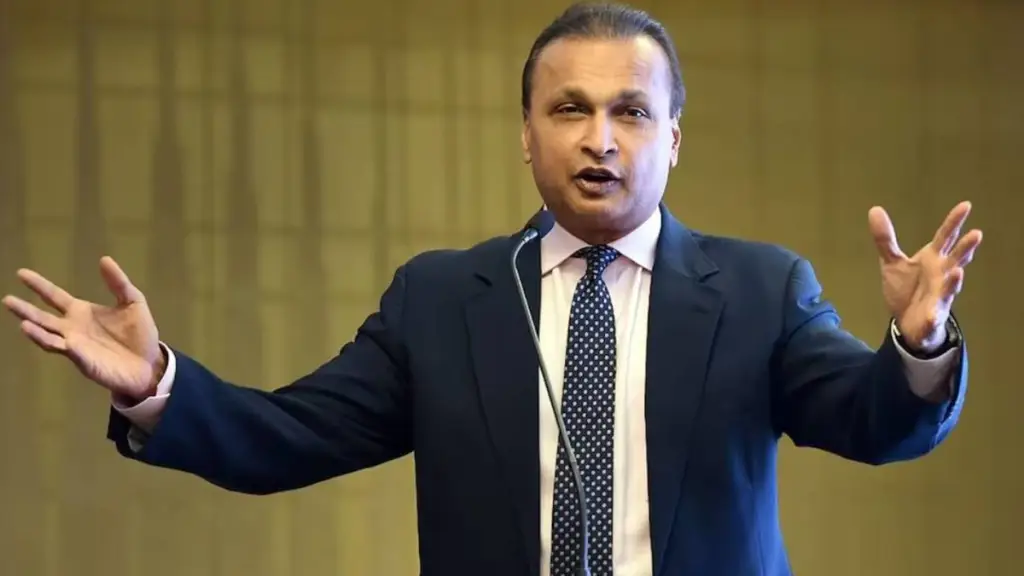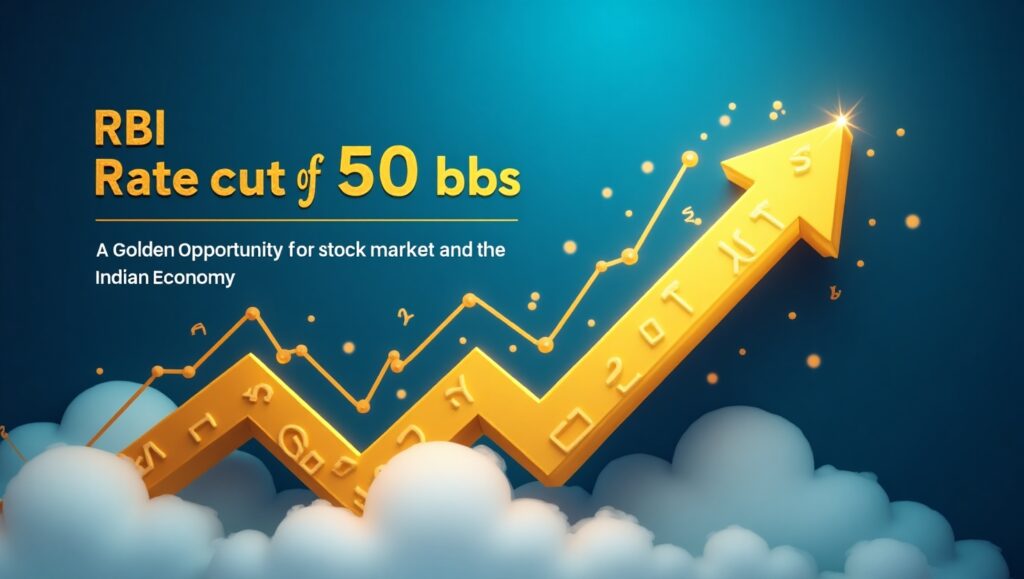$100,000 H-1B Fee Shock: Indian IT Giants Brace for Profit Crunch

Economic impact of the new H-1B proclamation (US$100,000 annual fee) on Indian IT firms company-wise estimated annual cost and likely business impact Introduction The United States has recently announced a new $100,000 annual fee on H-1B visas (for certain categories). The H-1B visa is crucial for Indian IT companies, as it allows them to send skilled engineers to work onsite for U.S. clients. For decades, this model has powered the growth of Indian IT giants TCS, Infosys, Wipro, HCLTech, and LTIMindtree. But now, this sudden hike in visa fees will create huge additional costs, potentially reducing profit margins and changing how these companies operate. This report breaks down the impact company-wise, explains the risks, and gives a Gujju Traders perspective on what lies ahead. Company-wise Impact Analysis To understand the effect, let’s look at how many H-1B visas each major Indian IT company received in FY25, and how much extra cost this new law adds. Estimated Additional Costs Company Approx. H-1B Approvals (FY25) Extra Cost in USD (millions) Extra Cost in INR (crores) FY25 Revenue (INR crores) Cost Impact % of Revenue TCS 5,364 $536.4 M ₹4,726 Cr ₹2,65,886 Cr ~1.8% Infosys 2,004 $200.4 M ₹1,766 Cr ₹1,69,857 Cr ~1.0% HCLTech 1,728 $172.8 M ₹1,522 Cr ₹1,17,055 Cr ~1.3% LTIMindtree 1,807 $180.7 M ₹1,592 Cr ₹38,008 Cr ~4.2% Wipro (est.) ~1,500 $150.0 M ₹1,321 Cr ₹89,090 Cr ~1.5% (Conversion rate: $1 = ₹88.1, Approximate values) What These Numbers Mean Sector-wide Implications Comparison of Impact Category Big IT Giants (TCS, Infosys, HCL) Mid-tier Firms (LTIMindtree, Mphasis, etc.) Revenue Base Very high (₹1–2.5 lakh crore) Moderate (₹30–40,000 crore) % Impact 1–2% of revenue 3–5% of revenue Survival Ability Strong – can absorb costs, renegotiate Weaker – may lose margins, competitiveness Long-term Strategy More U.S. local hiring + automation Aggressive offshoring, cost-cutting Gujju Traders View Gujju Punchline “Amrika na visa na nava niyamo IT sector ma tufaan laavše – mota players sambhāli laavše, pan nana-mota firmo ma margin no maari padše.” (The new U.S. visa rules will shake the IT sector – big players will manage, but smaller firms will feel a margin squeeze.)
Dhamaka on Dalal Street! Nifty Smashes 25,000 as GST Cuts Kick In

1. Introduction – The Landmark Moment On a historic day, the Nifty 50 crossed the 25,000 mark for the first time ever, sending shockwaves of optimism across Dalal Street. Investors cheered, traders booked profits, and policymakers smiled as India’s financial markets scripted yet another milestone. But this rise wasn’t just about liquidity, foreign inflows, or global cues. A major domestic factor played a central role: the recent Goods and Services Tax (GST) cuts announced by the GST Council. These cuts are more than just numbers on paper – they directly impact companies’ profitability, consumer demand, and investor confidence. To truly understand why the market soared, we need to dive deep into the ripple effects of these tax reforms. 2. GST Cuts: What Changed? The GST Council recently announced reductions in tax rates across key categories, targeting both consumer-facing sectors and manufacturing industries. Highlights include: These moves are designed to boost consumption, improve corporate margins, and reduce tax burden on end consumers. 3. Why the Stock Market Reacted Positively Markets respond not just to present realities but future expectations. Here’s why the GST cuts fueled such a rally: 4. Sector-by-Sector Breakdown 📺 A. Consumer Durables – TV, AC, Washing Machines 🚘 B. Electric Vehicles & Auto Ancillaries 🏗️ C. Cement & Real Estate 🏨 D. Hospitality & Tourism 🏥 E. Healthcare 5. Case Studies: How GST Cuts Play Out in Real Life Case 1: A Middle-Class Family Buying Appliances The Sharma family in Delhi had postponed buying a washing machine and refrigerator due to high costs. Post-GST cut, they save nearly ₹6,000 on both combined. Result? They purchase immediately → demand for companies like Whirlpool & LG rises → higher sales reported → stock price goes up. Case 2: An EV Buyer in Bangalore Ravi, a tech professional, wanted to buy the Tata Nexon EV. With GST cuts, the car is ₹30,000 cheaper. His purchase decision is faster. Tata Motors sells more units, reports record quarterly sales, and investors cheer. Case 3: A Builder in Ahmedabad Rajesh, a real estate developer, saves nearly ₹2 crore on cement costs for his 500-apartment project. He offers discounts to buyers, resulting in faster sales. UltraTech Cement benefits from bulk orders, its profits jump, stock price surges. Case 4: A Tourist in Goa Meera planned a holiday but was hesitant due to high hotel tariffs. After GST cut, she books a 4-night stay saving ₹5,000. Hotel chains like Indian Hotels see 20% higher bookings during festive season. Case 5: A Healthcare Scenario in Mumbai Priya’s father requires diagnostic tests costing ₹10,000. With GST cuts, her family saves ₹700–800. Lower medical costs boost hospital footfall, while diagnostic firms see more patients opting for preventive tests. 6. The Larger Economic Impact 7. Risks & Challenges 8. Market Outlook – Can Nifty Go Higher? With GST cuts, India’s consumption story looks brighter. Analysts believe: 9. Conclusion – A Win-Win for All The GST cuts are not just a tax reform – they are a confidence booster. From middle-class families to corporate giants, from first-time home buyers to hotel owners, the benefits flow across India’s economic chain. And as the Nifty touched 25,000, the message is clear – India’s growth story is intact, resilient, and ready to reach new heights.
ED raids nearly 50 sites linked to Anil Ambani in Rs 3,000 cr Yes Bank loan fraud probe

ED Raids Anil Ambani’s Reliance Group in Rs 3,000 Crore Money Laundering Case Linked to Yes Bank Loans Date of Incident: July 24, 2025Location: Mumbai & Delhi, India Introduction The Enforcement Directorate (ED), India’s top financial investigation agency, conducted widespread raids across multiple premises linked to Anil Ambani’s Reliance Anil Dhirubhai Ambani Group (RAAGA) on July 24, 2025. The action, stemming from allegations of money laundering and bank fraud, targeted over 50 entities and individuals associated with the group. The investigation is centered on suspicious loan disbursements totaling over Rs 3,000 crore from Yes Bank between 2017 and 2019. Scope of the Raids The ED carried out searches at over 35 locations in Mumbai and Delhi, covering: These raids are part of a broader investigation under the Prevention of Money Laundering Act (PMLA). Allegations and Investigative Background The origin of the probe lies in: Key Allegations: Market Reaction and Company Response Following the news of the ED action: In response, both companies issued statements: Regulatory & Financial Timeline Year Event 2017–2019 Yes Bank disburses large loans to RAAGA firms 2019 SEBI begins investigating insider trading and misreporting 2020 Anil Ambani declares bankruptcy in a UK court 2022 RAAGA firms face insolvency and restructuring bids 2025 ED initiates money laundering probe based on CBI and SEBI inputs Legal Implications & Future Action The ED is currently: If charges are proved, possible consequences include: Broader Impact on Business Ecosystem Conclusion The ED raids on Anil Ambani’s business empire signal a tightening noose around corporate corruption and bank fraud in India. With more regulatory bodies stepping up oversight, the case could redefine how legacy corporate groups approach financial discipline. As investigations proceed, the unfolding events will be watched closely by stakeholders across India’s financial ecosystem. Suggested By: Gujju Traders LLP
✈️ Prelude: Ready for Takeoff

02:30 PM (13:38 IST) — Taxiing and Takeoff 02:31 PM (13:39 IST) — Wheels Up, Trouble Begins 💥 02:32 PM — Cataclysm Unfolds The aircraft plummeted into Meghani Nagar, a densely populated locality near the airport. It struck the hostel block of BJ Medical College, a residential complex for medical students and doctors—amid lunchtime activity. Eyewitnesses reported: In under two minutes from takeoff, the aircraft was obliterated. Debris scattered over a wide radius, engulfing the building and surrounding areas. 🔥 02:33 PM Onward — Rescue & First Response First responders—CISF, CRPF, NDRF, IAF, BSF, local police, AMCPD, and NSG units—rose to immediate action: Local medical staff, including doctors and students inside the hostel, rushed to rescue and treat the injured, many of whom escaped by jumping from second-floor windows. (reuters.com) ⚰️ 02:35–05:00 PM — Tragic Toll 🧑🔧 Beyond the Tragedy — Official & Corporate Response Black Box Recovery & Investigation Preliminary Theories & Urgent Safety Worries Industry & Market Ripples Air India / Tata Group Commitment 🤝 Gujju Traders’ Voice: Grief, Action, Demand 1. Collective Sorrow & Solidarity We mourn with every bereaved family—whether British, Portuguese, Canadian, or Indian. We share their pain as brothers and sisters. A tragedy of this magnitude strikes deep into the business community that thrives on global connections. 2. On-the-Ground Relief Mobilization 🔹 Marketplace Fundraising 🔹 Aid via Warehouses & Volunteers 🔹 Food & Medical Teams 3. Advocacy for Safety Overhaul 🔧 Technical Transparency We urge complete openness about: 🛠️ Infrastructure & Emergency Readiness 👷 Audit of Air India Fleet & Training 4. Reaffirming Trade & Hope Ahmedabad traders depend on strong air links—particularly with the UK, where many Gujarati entrepreneurs and communities thrive. 🌍 National & Global Reactions 🏛️ Government Officials ⏭️ What Lies Ahead 🧭 Conclusion For the Gujarati trading community, Flight AI 171’s tragedy is both a personal plunge into grief and a community reckoning: In this hour of darkness, the Gujarati ethos comes alive: to mourn together, to aid together, to rebuild together—and to ensure that tragedy strengthens, rather than breaks, the community spirit we cherish. Note: This article draws from extensive reporting by CBS, Reuters, The Guardian, AP, Al Jazeera, Financial Times, and more. For detailed investigative updates, please refer to the citations embedded.
RBI’s Bold Rate Cut: A Golden Opportunity for Stock Market and the Indian Economy

On June 6, 2025, the Reserve Bank of India (RBI) implemented a significant monetary policy shift by reducing the repo rate by 50 basis points to 5.5% and the Cash Reserve Ratio (CRR) by 100 basis points to 3%. This marks the third consecutive rate cut this year, totaling a 100 basis points reduction, aimed at stimulating economic growth amid global uncertainties and subdued inflation . 📉 Understanding the Repo Rate Cut The repo rate is the interest rate at which the RBI lends money to commercial banks. A reduction in this rate: The concurrent CRR cut releases additional liquidity into the banking system, further enhancing the capacity of banks to extend credit . 📈 Economic Implications The RBI’s decision is a strategic move to “frontload” growth, aiming to: 🏗️ Benefiting Sectors and Stocks Several sectors are poised to benefit from the rate cut: 1. Real Estate Lower interest rates make home loans more affordable, stimulating demand, especially in the mid-income and affordable housing segments. Key beneficiaries include: 2. Automobile Industry Reduced loan rates are expected to boost vehicle sales. Companies likely to gain include: 3. Banking and Financial Services Increased credit demand can enhance the profitability of banks and NBFCs. Notable players are: 💹 Market Response The stock market responded positively to the RBI’s announcement: Rate-sensitive sectors like banking, automobiles, and real estate led the rally, reflecting investor optimism about the growth prospects . 💡 Strategic Insights for Gujju Traders For traders and investors, especially in Gujarat, this development offers: 🏁 Conclusion The RBI’s decisive action underscores its commitment to fostering economic growth while maintaining financial stability. For Gujju traders and the broader investor community, this presents a timely opportunity to capitalize on emerging trends and sectors. “Sasta loan, tez growth RBI’s gift to India’s growth engine!”
✈️ IndiGo Blockbuster: Gangwal Family Offloads ₹11,928 Crore Stake . What It Means for Long-Term Investors ?

🧾 Overview of the Block Deal On May 27, 2025, InterGlobe Aviation Ltd. (NSE: INDIGO), the parent company of IndiGo Airlines, witnessed a significant block deal. Co-founder Rakesh Gangwal and The Chinkerpoo Family Trust sold approximately 2.26 crore shares, representing a 5.7% stake, at an average price of ₹5,230.50 per share. The total transaction value amounted to ₹11,928 crore .ET Now+3Investing.com+3AnytimeInvest+3Reuters+13Business Today+13Business Today+13@EconomicTimes+3Upstox – Online Stock and Share Trading+3ET Now+3 The shares were sold at a 3.5% discount to the previous day’s closing price of ₹5,420, with a floor price set at ₹5,175 per share .Fortune India+4The Financial Express+4@EconomicTimes+4 📉 Market Reaction Following the block deal, IndiGo’s stock experienced a decline of up to 4.49%, reaching an intraday low of ₹5,230.50 on the NSE. By 10:15 AM IST, the stock had recorded a turnover of ₹13,789.12 crore, indicating substantial trading activity .AnytimeInvest+2Business Today+2ET Now+2 👤 Background on Rakesh Gangwal’s Stake Reduction Rakesh Gangwal, who co-founded IndiGo in 2006 alongside Rahul Bhatia, has been gradually reducing his stake in the airline. After resigning from the company’s board in 2022, Gangwal announced plans to divest his holdings over five years. From a 36.6% stake in 2022, the Gangwal family’s holding has decreased to approximately 13.5% as of March 31, 2025 .Upstox – Online Stock and Share Trading+14Reuters+14Fortune India+14Business Standard 🏦 Deal Management The block deal was managed by leading global investment banks, including Goldman Sachs, Morgan Stanley, and JPMorgan .@EconomicTimes+1Reuters+1 📈 Financial Performance Snapshot 🧠 Gujju Traders’ Perspective 🔍 Short-Term Implications The sizable block deal and subsequent stock price dip may cause short-term volatility. However, the sale is part of a planned divestment strategy by the Gangwal family and does not reflect the company’s operational performance.Business Today+1AnytimeInvest+1Business Today+1@EconomicTimes+1 📊 Long-Term Outlook IndiGo’s strong financial results and market leadership position it well for sustained growth. The airline’s focus on expanding its fleet and routes, coupled with India’s growing aviation market, offers promising prospects for long-term investors. ✅ Investment Recommendation While short-term fluctuations are expected, the fundamentals of IndiGo remain robust. Gujju Traders recommends that long-term investors view this as a potential opportunity to accumulate shares at a discounted price, keeping in mind the company’s strong market position and growth trajectory.
